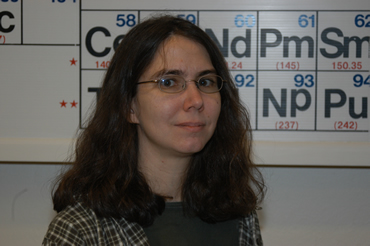






 |
 |
||||
 |
|||||
 |
|||||
 |
|||||
 |
|||||
 |
|||||
Students Prepare to "March for Women's Lives" in Washington, D.C.
Chemistry Professor Awarded $271,000 Grant
Retired Professor Passes Away
Debate Team Tackles Liberal Bias Issue
Students and Faculty Work to Use Less Energy
Catching Up With...Elizabeth Jackson
By Lou Dennig
Staff Writer
Chemistry professor Paula Schlax recently received a $271,000 grant
from the National Science Foundation (NSF) to conduct student-assisted research
on bacterial stress responses over the next three years.
Her research, which will include student assistance, is set to discover how
bacterial cells can survive when exposed to serious stresses through “exposure
to acid, exposure to temperatures that are not ideal and starvation.”
“The idea is to turn on an expression of a gene that’s needed
in a given time in a cell and a whole series of events have to occur in the
cell in the right order for that to happen. I’m trying to understand
the choreography of those events,” said Schlax.

The award is Schlax’s first major grant, but not the first for the department.
“When the NSF and the National Institute of Health (NIH) see the fact
that [Bates Professors] have had these grants, they recognize that people
have been successful with them, and it helps people who haven’t had
a grant from them get them with the help of the Bates name,” said Schlax.
“When I was looking at places to work, I was looking for a place where
people had been successful at getting major grants.”
One important aspect of her research, according to Schlax, is the hands-on
involvement of her students. “One of the best parts of coming to a school
like this is that [the students] can be involved in research like this with
an advisor. Bates, in general, does this really well; the students who do
it should be proud of it and other students should try to do it,” said
Schlax.
For her research, Schlax will be hiring a research assistant for the last
two years of the grant and will work with two Bates students per summer and
two to four thesis students per year for the next three years.
Schlax’s research, which will begin with studying pairs of molecules
and increase to sets of three and more over time, will lead her to more advanced
research. “In the really long term it would be fun to figure out why
some bacteria control the stress response in different ways from other bacteria
at the molecular level,” said Schlax.
Students doing research under Schlax will design experiments that focus on
specific aspects of the research that would be “most helpful to them,”
writing papers based on the findings, and even helping Schlax present the
materials when the studies are complete. Bates students “should get
involved in research, and we have great projects coming up for them, it’s
one of the best parts of Bates,” said Schlax.
Respond to this article.